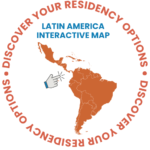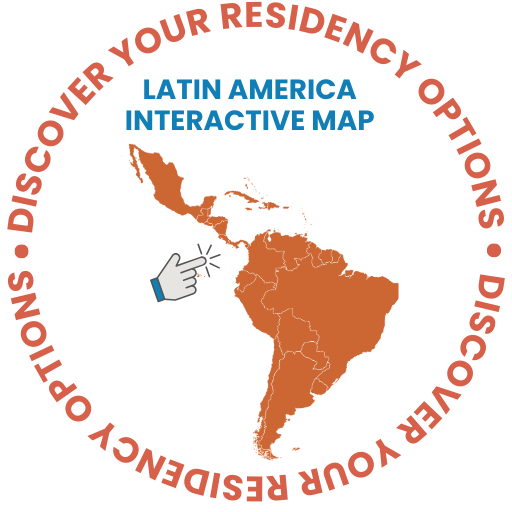24 min read
Tropical beaches, turquoise waters, and the promise of a slower pace—Caribbean life has serious appeal. But paradise comes with trade-offs. Before you make the leap, get clear on the real-life pros and cons of living in the islands.
……………………………..
Life in the Caribbean can truly be a dream lifestyle for many people. The breathtaking beaches, warm weather, and laid-back lifestyle are just a few reasons why people choose to call this region home.
However, like any other place in the world, there are pros and cons to life in the Caribbean.
Imagine waking up to the bright sunshine every morning, taking a refreshing swim in the crystal clear sea, enjoying fresh seafood, and sipping cold beer with your toes in the sand. Life doesn’t get much better than that!
But it’s important to note that the Caribbean is a vast region, and each island nation has its own unique culture and traditions. Your experience of life in the Caribbean can vary depending on the specific island you choose.
In this blog post we’ve gathered information from reliable sources to explore the advantages and disadvantages of life in the Caribbean.
Table of Contents
Is Life in the Caribbean Your Dream? Discover the Pros and Cons
1. Residency and Citizenship for Life in the Caribbean
Life in the Caribbean can pose significant advantages and challenges when it comes to acquiring residency and/or citizenship. Each Caribbean country has its own distinct regulations nevertheless, here are the pros and cons that applicants may face across the region
These are some of the types of Residency options available in the Caribbean:
This status is more secure and generally requires you to live in the country for a longer duration. It often involves proving economic stability, contributing to the local community, or fulfilling certain legal requirements.
Many Caribbean countries offer temporary residency permits that allow you to stay for a specific period, usually ranging from 1 to 2 years. These permits might be tied to employment, study, or retirement.
Some Caribbean nations offer residency in exchange for significant financial
investment.
Here are the Citizenship options for living in the Caribbean:
If you have Caribbean heritage, you might be eligible for citizenship through descent. This usually requires proof of lineage, such as birth certificates or other official documents linking you to a Caribbean citizen.
You would typically need to live in the country for a certain number of years, demonstrate integration into the society, and meet other requirements. The process can vary greatly between countries.
This is a popular option in the Caribbean, where several countries offer citizenship in exchange for financial investment. Each country has its own investment thresholds and requirements.
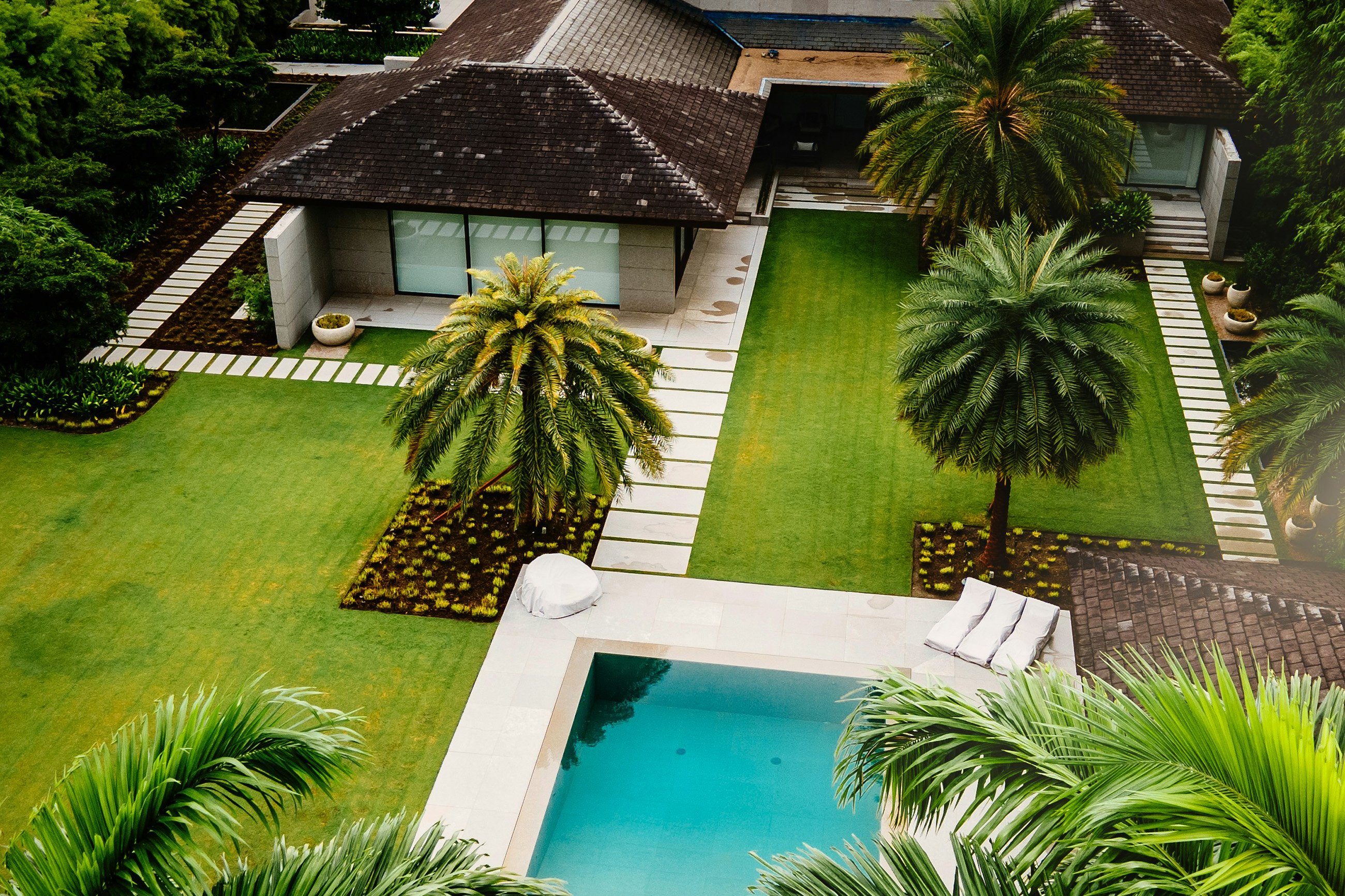
A stunning view of a Caribbean villa’s backyard—an oasis of luxury and tranquility perfect for life in the Caribbean.
| RESIDENCY & CITIZENSHIP | PROS | CONS |
|---|---|---|
| Legal Requirements | Many Caribbean countries make it surprisingly straightforward to gain residency or citizenship, which is a huge plus if you’re considering life in the Caribbean. Some nations only require a minimum investment in property or a local business, while others set stricter standards such as proof of income or certain educational qualifications. | The application process can be complex with a significant amount of paperwork, and the requirements can vary depending on the specific country and type of residency being applied for. This can be overwhelming and frustrating for applicants, especially if they are not familiar with the process or do not have a strong support system. |
| Financial Thresholds | Individuals can invest in the local economy, contribute to the development of the country, and enjoy various benefits associated with residency and/or citizenship status. | Applicants must pay various fees, including application fees, legal fees, and due diligence fees. These fees can add up quickly, and the total cost can be prohibitively high. |
| Application Processing Times | Processing times can vary significantly based on the country and the specific type of residency or citizenship. In certain situations, you have the option to pay an additional fee to expedite your application process. | Processing times can be lengthy and unpredictable. |
| Cultural Integration | For individuals, families, and communities, life in the Caribbean offers rich cultural exchange, opportunities to build language skills, delicious cuisine, and access to stunning natural scenery. | May require proof of cultural integration efforts such as language proficiency tests if the official language is different from the applicant’s native language. |
| Real Estate Investment Risks | High potential returns, portfolio diversification, lifestyle benefits, tax advantages, citizenship opportunities, and a strong rental market. | In cases where an investment in property is required for residency and/or citizenship, applicants must navigate the local real estate market. |
| Legal Representation | Expert guidance through complex legal processes, personalized support, advocacy in legal matters, and risk mitigation against application denials or delays. | Navigating immigration laws often necessitates hiring legal representation or consultants who specialize in Caribbean immigration. |
| Renewal Requirements & Policy Changes | Security, economic stability, quality of life, immigration control, sustainable development, social cohesion, and international compliance. | Once permanent residency is granted, there may be renewal requirements that must be met periodically. Immigration policies can change with new political administrations or evolving economic circumstances. |
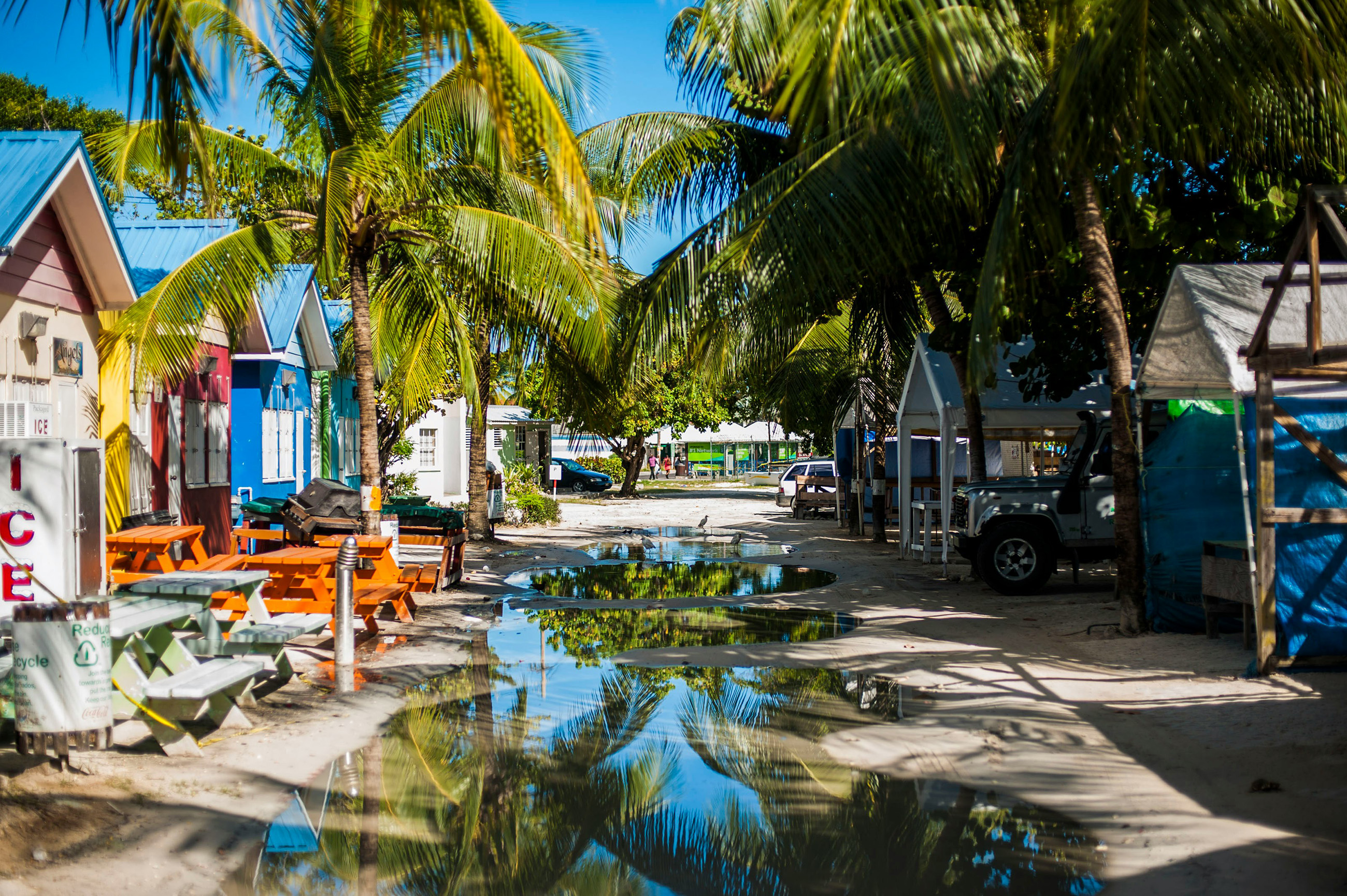
A charming Caribbean street lined with palm trees—a perfect blend of local culture and island life.
2. Taxes and Expat Life in the Caribbean
Living a Caribbean lifestyle can offer several tax advantages depending on the specific jurisdiction, as tax laws vary from one Caribbean country to another.
For instance many countries in the Caribbean are also considered tax havens.
But to determine the tax burdens for an expat living in the Caribbean, we need to consider several factors such as the individual’s residency status, income sources, type of employment, and the specific country they are residing in.
It’s important to note that tax laws can vary significantly among Caribbean countries.
However, here is a general overview of potential tax advantages and burdens that expats may face.
| TAXES | PROS | CONS |
|---|---|---|
| Residency Status | Many Caribbean islands do not levy personal income tax. | Some Caribbean countries consider individuals tax residents if they spend a certain number of days there in a given year — an important factor to understand when planning life in the Caribbean. |
| Income Tax | Many Caribbean islands do not levy personal income tax, which means that residents might not have to pay taxes on their worldwide income. | Caribbean countries typically impose income tax on residents’ worldwide income and non-residents’ locally sourced income. The rates and thresholds may vary from country to country. |
| Capital Gains Tax | In some jurisdictions, there is no capital gains tax, which means that the profit from the sale of an asset like property or stocks is not taxed. | Some Caribbean countries levy capital gains tax on the sale of certain assets, such as real estate or securities. |
| Property Taxes | Several Caribbean islands do not impose inheritance or estate taxes. | Expats who own property in the Caribbean may be subject to property taxes imposed by the respective country or local municipality. |
| Value Added Tax (VAT) | While some Caribbean countries have implemented VAT, others have not, and even among those that have, the rates can be lower than in many European countries. | Several Caribbean countries have implemented a consumption tax. |
| Withholding Taxes | Some countries have specific provisions for withholding taxes on various types of income, while others may have exemptions or reduced rates for certain types of payments. | If an expat receives income from sources outside the Caribbean, such as dividends, interest, or royalties, they may be subject to withholding taxes imposed by their home country. |
| Offshore Banking | The Caribbean is known for its offshore financial services industry. These banks are not subject to the same regulatory oversight as banks in the West. | Caribbean banking typically comes with high fees, limited services, tax complications, and even political or reputational risk — all factors that can affect daily life in the Caribbean. |
| Tax Holidays and Exemptions | New businesses and certain industries may be eligible for tax holidays or exemptions, as an incentive to stimulate investment and economic growth. | Often temporary and when they expire there could be significant increases in the tax burden. Tax incentive programs can create uncertainty and confusion leading to compliance challenges and potential legal issues. There may be preferential treatment given to certain industries or individuals through tax exemptions that potentially affect social cohesion and expat integration. |
| Corporate Tax Incentives | Some Caribbean nations offer attractive corporate tax incentives to businesses that establish operations on their shores. | Tax incentives can create an uneven playing field, disadvantaging other businesses. Working for companies benefiting from incentives may face uncertainty regarding the long-term viability of their employment if the incentives are temporary or subject to change. The risk of reduced government revenue could impact a Administration and oversight of corporate tax incentives may lack transparency, leading to concerns about fairness and accountability. |
| Free Trade Zones | Certain islands offer free trade zones where goods can be stored, manufactured, or repackaged without being subject to import duties or taxes. | There could be the potential for exploitation of labor. Focus on export- industries within FTZs may limit opportunities for other sectors. Preferential treatment given to businesses operating in FTZs can create unfair competition for companies outside these zones. FTZs may have fewer regulations regarding pollution and waste management. |
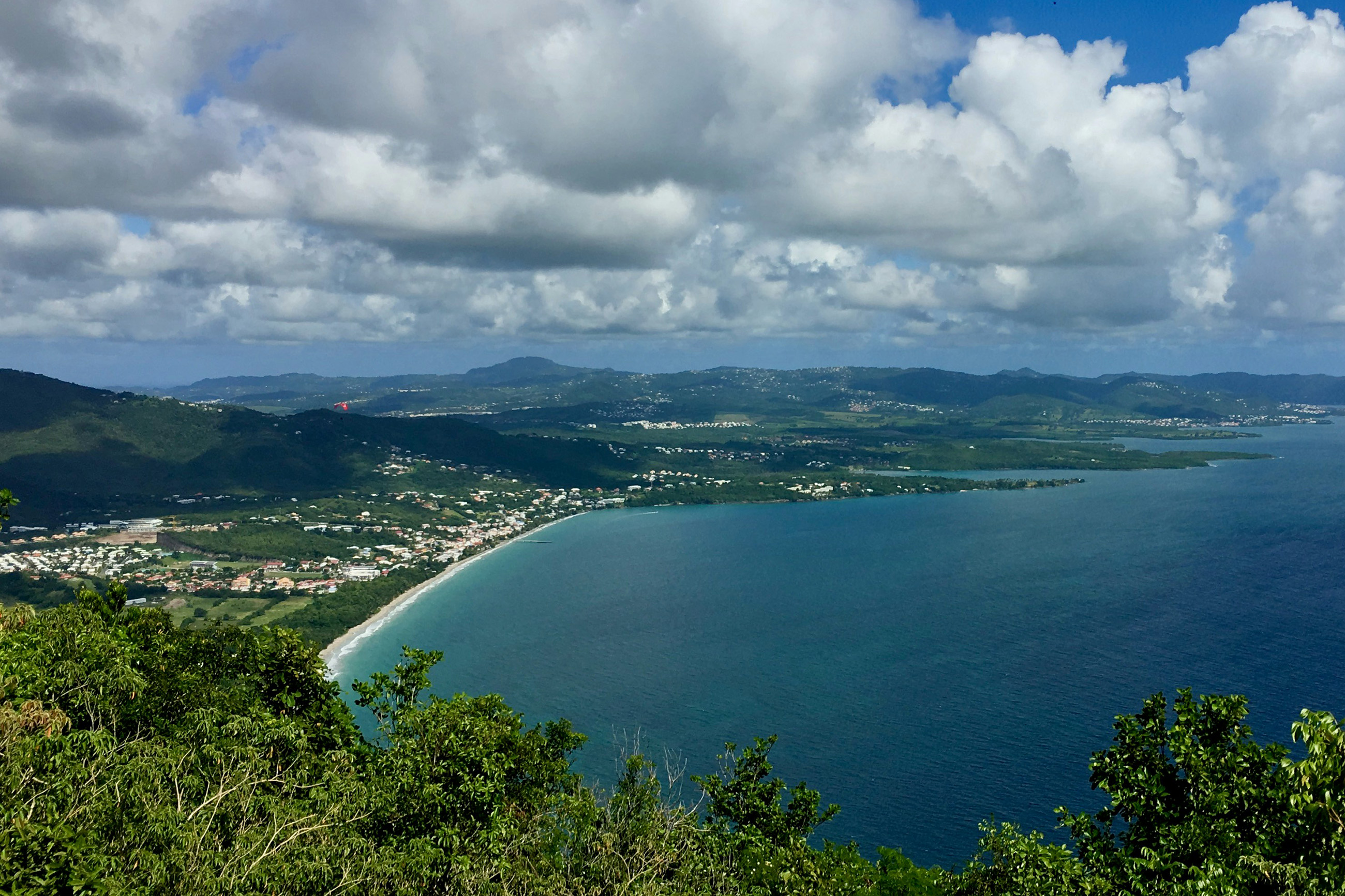
An aerial view of a stunning Caribbean tropical island—a perfect paradise for island living.
3. The Real Cost of Life in the Caribbean
The cost of living in the Caribbean can vary significantly depending on the specific island and even the neighborhood. For anyone considering life in the Caribbean, it’s important to note that tourist-heavy areas usually come with higher prices due to strong demand for housing, groceries, and dining.
Housing in popular destinations can be especially costly, while day-to-day expenses like food and entertainment often carry a premium compared to mainland prices.
On the other hand, life in the Caribbean can be much more affordable in rural or less touristy areas. Factors such as import taxes, infrastructure development, and local economies all play a role in shaping overall costs.
Below are cost of living rankings for several Caribbean islands, from most expensive to least expensive, with the United States and Canada included as reference points.
| RANKING | COUNTRY |
|---|---|
| 1 | Bermuda |
| 2 | Bahamas |
| 3 | Cayman Islands |
| 4 | Barbados |
| 5 | United States |
| 6 | Puerto Rico |
| 7 | Canada |
| 8 | Trinidad And Tobago |
| 9 | Jamaica |
Many Caribbean islands face a higher cost of living because of their relative isolation and their reliance on imports for various goods.
On the other hand many people find that the overall cost of living is actually lower compared to their home country. Depending on your lifestyle and the island you choose the cost of living can vary, however, there are also some common factors that contribute to the cost of living in this region.
| COST OF LIVING | PROS | CONS |
|---|---|---|
| Tax Incentives | Several islands have implemented tax incentives to attract foreign residents and investors. | These incentives usually only apply to higher net worth individuals. |
| Import Taxes & Custom Duties | Import taxes help support local industries and small businesses. For many, this makes life in the Caribbean more authentic, with fresher local products and a stronger community-based economy. | Many Caribbean countries impose import taxes and customs duties on goods brought into the country. These additional costs can significantly affect the overall cost of life in the Caribbean, especially for those who depend on imported goods or plan to bring personal belongings or vehicles when relocating. |
| Capital Gains Tax | In some jurisdictions, there is no capital gains tax, which means that the profit from the sale of an asset like property or stocks is not taxed. | Some Caribbean countries levy capital gains tax on the sale of certain assets, such as real estate or securities. |
| Strong Agriculture | Many Caribbean islands grow their own produce, which means life in the Caribbean often comes with access to fresh, locally sourced fruits and vegetables at lower prices than imported goods. | Reliance on local agriculture can also mean limited variety for residents, making life in the Caribbean sometimes less convenient for those accustomed to a wide selection of international products. |
| Limited Availability & Variety | On the positive side, this limited variety often encourages a slower, more relaxed pace and a closer-knit community, which can make life in the Caribbean feel more personal and connected. | Since these islands are relatively small and have smaller populations compared to mainland countries, life in the Caribbean may come with fewer options for shopping, dining, entertainment, and healthcare. |
| Housing Costs | By considering renting, community-led housing projects, and fixer-uppers, and by being flexible about location and amenities. | Housing costs can be extremely high on popular islands or highly sought-after areas with limited housing supply. Rental prices and property values can be inflated due to high demand from tourists and expats. Additionally, building materials may need to be imported, which can further increase construction costs. |
| Fishing Industry | Fishing is an important industry in the region, making seafood more accessible and reasonably priced. | |
| Transportation | With smaller land masses, commuting distances are generally shorter, reducing fuel expenses and travel time. Public transportation systems offer affordable options for getting around. | Transporting goods and people to and from Caribbean islands can be expensive due to the necessity of air or sea travel. Flights from Caribbean islands may require multiple connections or longer travel times, which can add up in terms of expenses. Also transportation costs within the islands themselves can also be higher than in mainland countries. This includes the cost of fuel, vehicle maintenance, public transportation, and inter-island travel. |
| Utility Expenses | Some islands heavily rely on renewable energy like solar power or wind turbines, which can result in some lower electricity bills. | The reliance on imported energy sources and the need for desalination plants for fresh water can contribute to increased utility costs. Internet connectivity may also be slower or less reliable in some areas. |
| Limited Job Opportunities | Larger national companies that have a presence in the Caribbean often hire and provide well for their employees, making life in the Caribbean more stable for those seeking traditional employment. Additionally, some islands are well set up for self-employment or working online, offering flexibility and freedom as part of life in the Caribbean. | Caribbean islands often have smaller economies compared to mainland countries, resulting in limited job opportunities, especially in certain industries. The job market may be more focused on tourism, hospitality, and other sectors related to the island’s main economic activities. Finding employment that matches one’s skills and qualifications can be challenging, potentially leading to lower salaries. |
| Higher Insurance Costs | Due to the vulnerability of Caribbean islands to natural disasters such as hurricanes and tropical storms, insurance costs can be higher compared to mainland countries. |

Ready to catch the waves—a perfect example of the active outdoor life in the Caribbean.
4. Healthcare and Life in the Caribbean: Pros and Cons
Healthcare while living in the Caribbean can be multifaceted and depends on several factors, including the specific country, personal health needs, and insurance coverage. Life in the Caribbean may offer adequate healthcare facilities in some countries, while others may lack the infrastructure to provide comprehensive care.
| HEALTHCARE | PROS | CONS |
|---|---|---|
| Travel for Healthcare | Many Caribbean residents enjoy the flexibility of regional medical travel, giving life in the Caribbean a level of access to high-quality care that combines local convenience with nearby specialized options. | Smaller islands might not have advanced medical facilities, which means life in the Caribbean could require traveling to a neighboring island or even back to an expat’s home country for certain treatments. |
| Private Health Insurance | Some Islands have partnerships with reputable international healthcare providers, ensuring access to advanced medical treatments and technologies. | Can be costly and might not cover all medical services or treatments. Without insurance, expats may face high out-of-pocket expenses for even basic medical care. |
| Government Healthcare | Many popular tourist destinations in the Caribbean have well-established healthcare systems that cater to both residents and visitors. These healthcare facilities often offer a range of medical services, including general practitioners, specialists, hospitals, and clinic. | In many Caribbean nations, healthcare can be expensive, particularly for expatriates who may not qualify for any subsidized health services that are available to local residents. |
| Medications & Supplies | Many Caribbean residents enjoy the flexibility of regional medical travel, giving life in the Caribbean a level of access to high-quality care that combines local convenience with nearby specialized options. | Smaller islands might not have advanced medical facilities, which means life in the Caribbean could require traveling to a neighboring island or even back to an expat’s home country for certain treatments. |
| Emergency Medical Services (EMS) | Many Caribbean islands have well-trained local EMS teams in major towns, and life in the Caribbean often encourages proactive health planning, including access to private ambulance services and medevac options for serious emergencies. | In case of a serious illness or accident, life in the Caribbean can come with slower or less reliable emergency response compared to more developed countries. Additionally, medical evacuation (medevac) can be extremely expensive without proper insurance coverage. |
| Language Barrier | Google translate can come in handy during urgent situations, although it may not be perfect. | Although English is widely spoken across many Caribbean islands, there are areas where other languages like Spanish, French, or Dutch are predominant. Expats who do not speak the local language may struggle with communication in healthcare settings. |
| Cultural Differences | Local treatments have the potential to be more effective and superior in certain cases. Additionally, incorporating regular physical activity into your routine can greatly enhance your overall health and well-being. | Attitudes towards patient care, privacy standards, appointment scheduling, and expectations for service can lead to misunderstandings or dissatisfaction with the care received. |
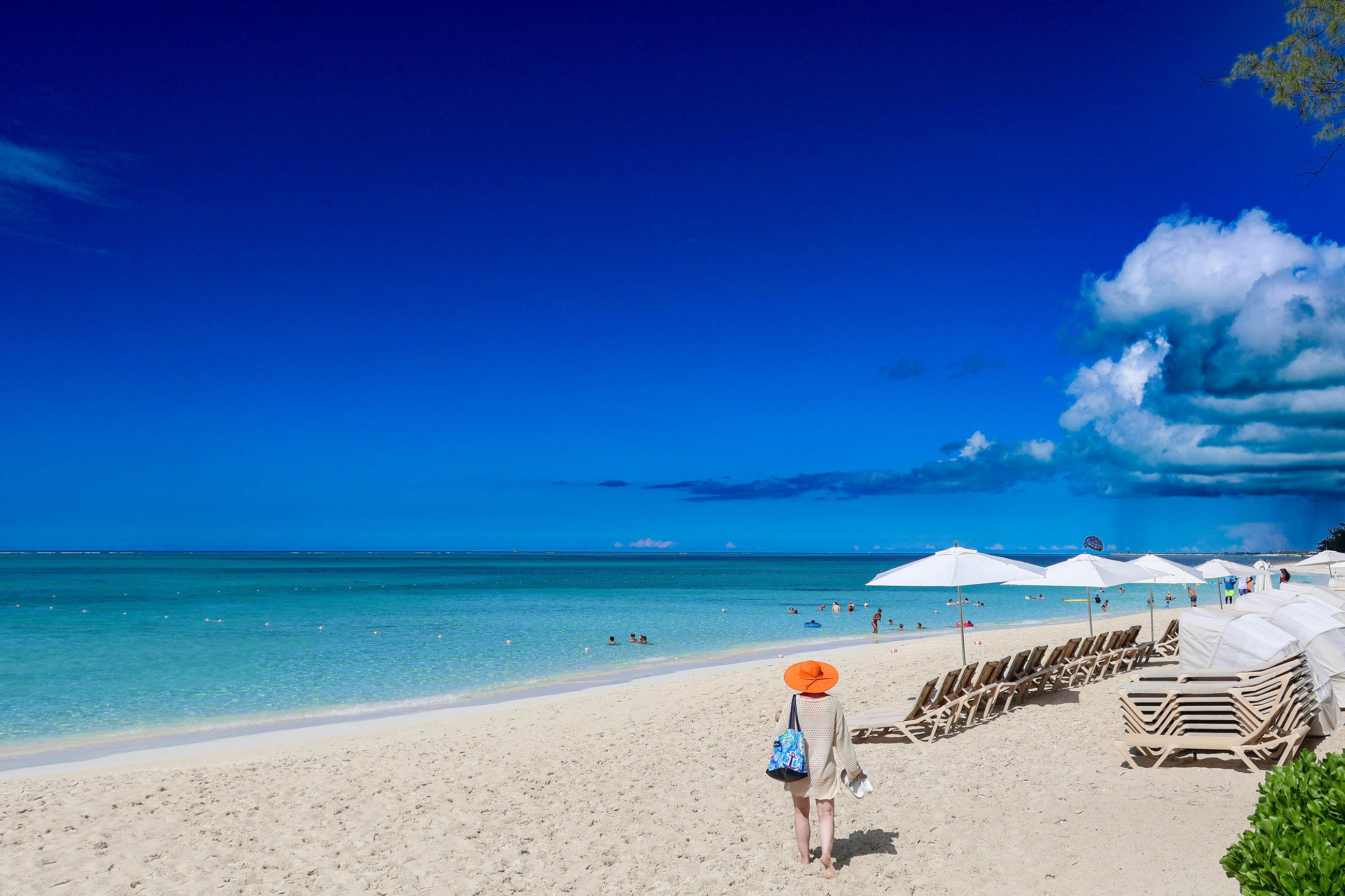
A picturesque Caribbean scene—a perfect blend of island life and natural beauty.
5. Climate Realities of Life in the Caribbean
Living in the Caribbean with a tropical climate comes with upsides and downsides. The pleasant warmth and abundant sunshine create the perfect environment for outdoor adventures. However, it’s important to acknowledge that the region is susceptible to hurricanes and other natural calamities.
| WEATHER | PROS | CONS |
|---|---|---|
| Perfect Temperature | With temperatures ranging from 82°F to 86°F (28°C to 30°C) during the day and around 77°F (25°C) at night, the weather is consistently moderate and breezy throughout the year. | Even with fantastic weather, life in the Caribbean can feel monotonous for those who crave seasonal changes, as temperatures often remain consistent year-round. |
| Hurricanes & Tropical Storms | Some islands, like Aruba, Bonaire, and Curacao, are located outside of the hurricane belt and have a significantly lower probability of being affected by hurricanes. | Life in the Caribbean comes with the risk of hurricanes and tropical storms. The region is prone to these natural disasters during hurricane season, which typically runs from June to November, and residents need to plan and prepare accordingly. |
| High Humidity | The consistent warmth and humidity support lush landscapes, tropical fruits, and year-round outdoor living, making life in the Caribbean vibrant and full of natural beauty. | Life in the Caribbean comes with a tropical climate, meaning high temperatures and humidity throughout the year. This can lead to challenges such as mold growth and an increased risk of heat-related illnesses. |
| Drought | Some Caribbean islands have implemented water conservation measures and sustainable agriculture practices, which help maintain a stable lifestyle and make life in the Caribbean more resilient despite occasional dry spells. | Some islands may experience periods of drought, which can affect water supply and agricultural activities, creating challenges for those living in the Caribbean. |
| Flooding | On the positive side, the region’s abundant rainfall supports lush landscapes, vibrant ecosystems, and thriving agriculture, contributing to the natural beauty that makes life in the Caribbean so appealing. | Heavy rainfall events can lead to flooding and landslides in certain areas, which can disrupt life in the Caribbean and affect property and infrastructure. |
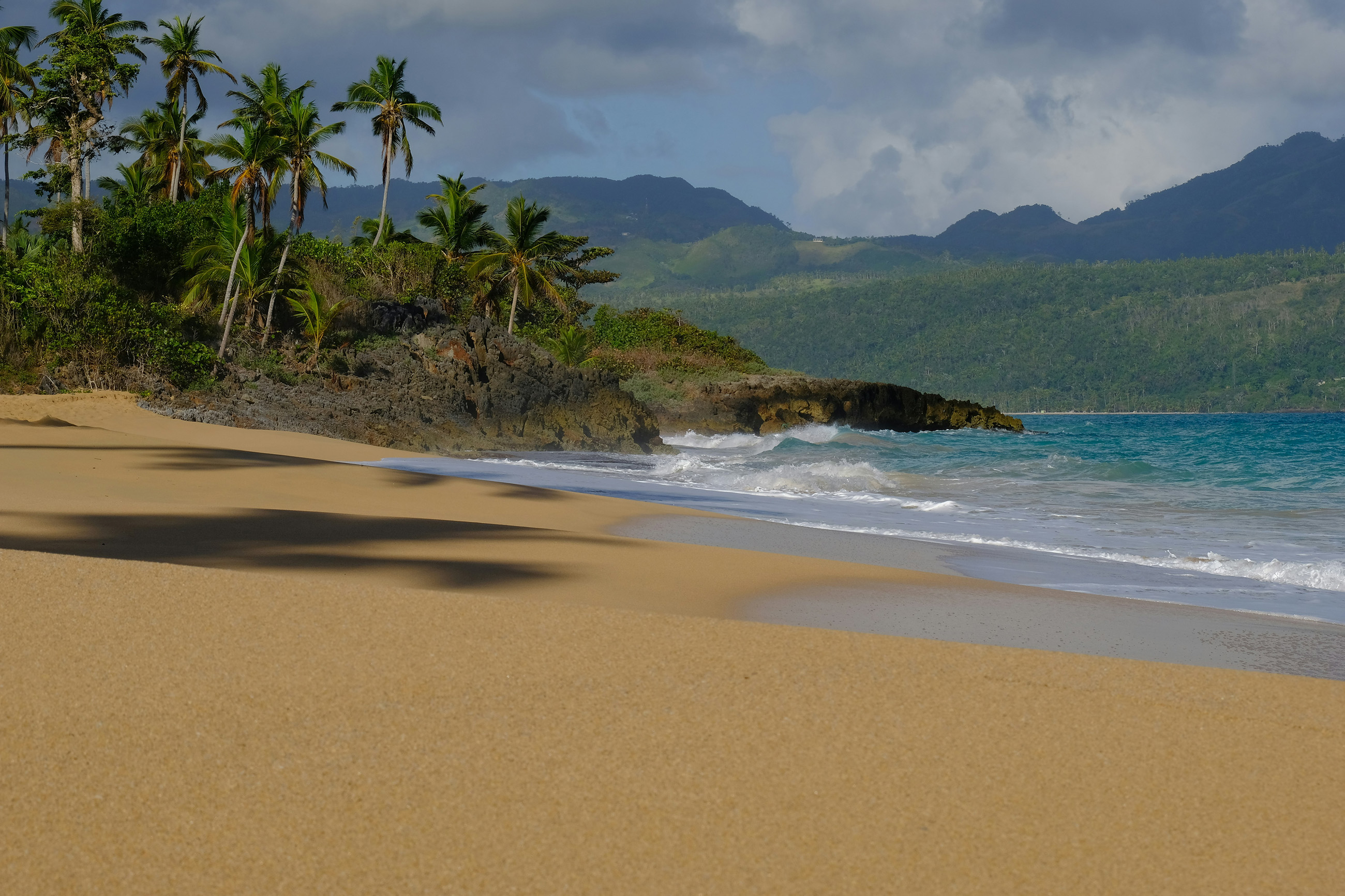
A stunning beach scene with crystal-clear water—perfect for a relaxed life in the Caribbean.
6. More Advantages of Life in the Caribbean
One of the biggest bonuses of a Caribbean lifestyle is the stunning scenery. From white sandy beaches to lush rain forests, the region is full of natural beauty. Living in such a picturesque location can be a great source of inspiration and relaxation.
Tropical Climate: The consistent climate eliminates the need for heavy clothing and allows for a more relaxed, outdoor lifestyle.
- Tropical Climate: The consistent climate eliminates the need for heavy clothing and allows for a more relaxed, outdoor lifestyle.
- Pristine Beaches: Caribbean islands are famous for their beautiful beaches with fine white sand and crystal-clear turquoise waters.
- Lush Landscapes: Beyond the beaches, many Caribbean islands boast lush rain forests, waterfalls, and vibrant botanical gardens that create a paradise for nature lovers.
- Biodiversity: The Caribbean islands are home to a rich variety of flora and fauna, some of which are endemic to the region.
- Coral Reefs: The surrounding coral reefs offer stunning underwater scenery that is accessible through snorkeling or diving.
- Sunrises and Sunsets: Due to their geographic location, Caribbean islands offer spectacular sunrises and sunsets over the ocean.
- Clean Air: Many islands have relatively low levels of pollution compared to urban areas on continents.
- Outdoor Lifestyle: The natural beauty of Caribbean islands encourages an outdoor lifestyle that promotes physical well-being.
With access to beautiful beaches and clear waters, residents can enjoy a wide range of water-based activities such as swimming, snorkeling, diving, sailing, and fishing. A Caribbean lifestyle offers a laid-back range of outdoor activities.
- The crystal-clear turquoise waters surrounding the islands provide excellent opportunities for swimming, snorkeling, scuba diving, and various other water sports. The Caribbean is home to some of the world’s most beautiful coral reefs and marine ecosystems, making it a paradise for underwater exploration.
- Living on a Caribbean island offers great opportunities for boating and sailing. With its numerous bays, coves, and marinas, residents can easily indulge in recreational boating or even participate in sailing races and regattas.
- The region is famous for its pristine white sand beaches lined with palm trees, offering an idyllic setting for sunbathing, picnicking, or simply enjoying a leisurely stroll along the shoreline.
- Many islands are blessed with natural wonders such as rain forests, waterfalls, and hiking trails.
- The region is known for its vibrant music, dance, and festivals, from the lively rhythms of reggae and calypso to the colorful costumes and energetic dances of Carnival, living on a Caribbean island allows individuals to embrace and engage with diverse cultural experiences.
The Caribbean Islands offer several cultural advantages that contribute to a unique and enriching lifestyle. These advantages include a vibrant and diverse cultural heritage, a strong sense of community from locals and expats, and an abundance of traditional arts and festivals.
- The Caribbean islands have been influenced by various cultures throughout history, including indigenous peoples, European colonial powers, African slaves, and immigrants from other parts of the world. This diverse mix of cultures has created a unique blend of traditions, languages, music, cuisine, and art forms that are distinct to each island.
- People have close-knit relationships with their neighbors and extended families. The concept of community is highly valued, and individuals often come together to support one another during times of celebration or hardship. This sense of community fosters a warm and welcoming atmosphere where people feel connected and supported.
- The islands are known for their rich artistic traditions, including music genres such as reggae, calypso, salsa, and zouk. These musical styles are often accompanied by lively dance forms like salsa, meringue, and soca.
- The islands host numerous festivals throughout the year where locals and visitors can experience the vibrant culture firsthand. These festivals showcase traditional music, dance performances, colorful costumes, delicious local cuisine, and other cultural expressions.
A Caribbean lifestyle can offer several investment opportunities depending on the specific island and its economic conditions, but some common benefits include tourism, real estate, natural resources, and tax incentives.
- Tourism: Investors can consider building or acquiring hotels, resorts, vacation rentals, restaurants, and other hospitality businesses to cater to the growing number of tourists visiting the region.
- Real Estate: Many individuals from around the world aspire to own vacation homes or retirement properties in the Caribbean. This demand drives property prices up and offers potential to generate regular rental income from tourists or long-term residents.
- Natural Resources: Some Caribbean islands are rich in natural resources such as oil, gas, minerals, and renewable energy sources like wind and solar power.
- Tax Incentives: These incentives may include tax breaks, exemptions, or lower tax rates on income, capital gains, dividends, or property ownership.
- Economic Stability: Many Caribbean islands have stable economies with strong ties to global markets. Furthermore, some islands have established financial centers that attract international businesses and investors looking for offshore banking, investment funds, or wealth management services.
- Diversification of Investment Portfolio: By allocating funds across different geographical regions and industries, investors can reduce the risk associated with having all their investments concentrated in one area.
Living on a Caribbean island and embracing a slower pace of life can offer numerous advantages and benefits. These advantages stem from the unique lifestyle, environment, and cultural aspects that are often associated with island living. For those seeking the same lifestyle on a different continent, Mexico offers a similar beach lifestyle, complete with picturesque coastlines, welcoming communities, and a rich coastal culture.
- Reduced Stress Levels: One of the primary advantages of living on a Caribbean island with a slower pace of life is the potential reduction in stress levels.
- Enhanced Work-Life Balance: A slower pace of life allows individuals to prioritize their personal lives and strike a better work-life balance.
- Connection with Nature: Caribbean islands are renowned for their stunning beaches, crystal-clear waters, lush tropical landscapes, and diverse marine ecosystems.
- Health Benefits: The slower pace of life on a Caribbean island can also contribute to improved physical health.
- Strong Sense of Community: Caribbean island communities often have a strong sense of camaraderie and community spirit.
- Cultural Immersion: Living on a Caribbean island provides an opportunity to immerse oneself in a rich and vibrant local culture.
- Slower Rhythm of Life: The slower pace of life on a Caribbean island allows individuals to savor and appreciate the present moment.
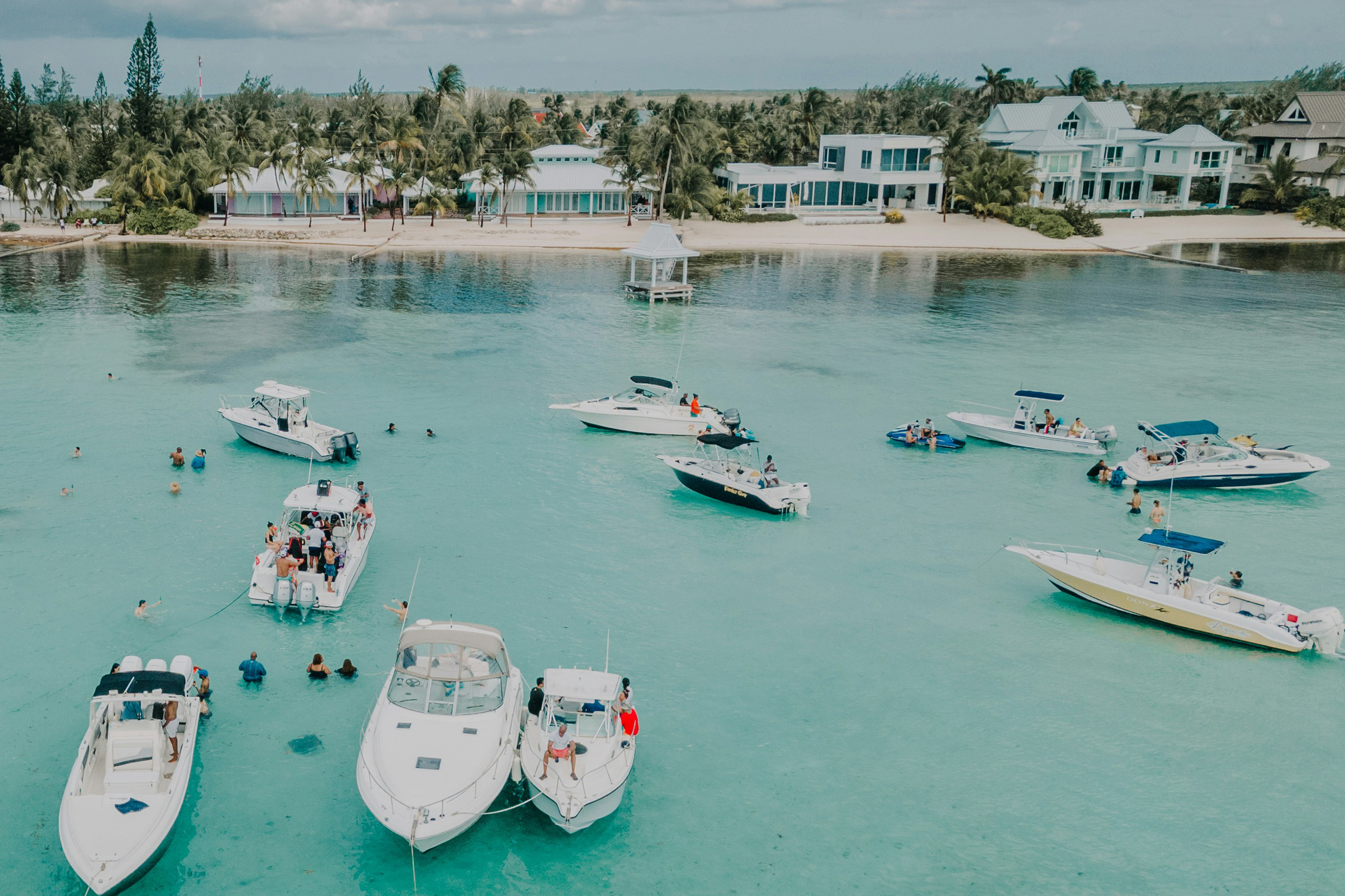
A typical scene of life in the Caribbean—a perfect escape for those seeking peace and natural beauty.
7. Challenges of Life in the Caribbean — and How to Overcome Them
Battling Bugs in the Caribbean: What You Need to Know
Living a Caribbean lifestyle can be an exciting, but you have to be prepared for the challenges of dealing with bugs, spiders, and mosquitoes.
- Health Risks: Mosquitoes, in particular, are known to transmit diseases such as dengue fever, Zika virus, and chikungunya. Expats may be more susceptible to these diseases as they may not have been exposed to them before.
- Spiders, although generally not a significant health risk in the Caribbean, can still cause discomfort and potential allergic reactions if bitten.
- Nuisance and Discomfort: Mosquitoes are notorious for their incessant biting, which can result in itchy welts and disturbed sleep. Additionally, their buzzing sound can be irritating. Bugs such as flies and ants may invade homes and food storage areas, leading to frustration and inconvenience for expats.
Modern Conveniences? Not Always on Island Time
Keep in mind that you may not have access to everyday conveniences like Walmart or Starbucks, and the cuisine will mainly consist of seafood. Be prepared for higher food prices due to limited supply.
- Professional Challenges: In many Caribbean territories, the approach to deadlines, meetings, and project completions can be much more laid back compared to what they are accustomed to in more fast-paced economies.
- Economic Implications: A slower pace of life may also translate into less economic activity and opportunities.
- Cultural Adjustment: Adjusting to a new culture always has its challenges, but the transition from a fast-paced society to one that operates on “island time” can be particularly difficult for some.
- Health Care Accessibility: The health care systems in many Caribbean countries may not operate with the urgency and availability that expats from countries with robust healthcare infrastructure expect.
- Convenience Factors: In line with the relaxed atmosphere, services like shop opening hours, public transportation schedules, and even dining options may not be as convenient or as readily available as in more fast-paced societies.
- Education Concerns: For expats with families, the slower pace might extend into the educational sector where schools may not meet the standards or intensity they desire for their children’s education.

Refreshing tropical drinks – a vibrant taste of life in the Caribbean.
Fitting In: Embracing the Local Vibe
Living in a close-knit community like an island can have its pros and cons.
- It’s great to be part of a strong community where everyone knows each other. However, the saying “news travels fast” perfectly captures the social life on an island.
- It can be challenging to keep personal matters private, and you’ll constantly run into familiar faces every day.
- Additionally, as an expat, the community is transient, and you’ll often have to bid farewell to beloved island family members.
- Another challenge of living in a small community on a small island is the potential for isolation. This can make it difficult for residents to travel or visit family and friends outside of the island.
- The limited population size can result in a lack of diversity and cultural experiences, which may lead to feelings of isolation or boredom over time.
- The limited resources and remote location of small islands may make recovery from natural disaster efforts more challenging compared to larger, more connected areas.
Safety in Paradise: What You Should Know
Life in the Caribbean, like any other region, has its own problems when it comes to crime. It is important to note that while crime exists in some areas of the Caribbean, it does not mean that the entire region is unsafe or should be avoided. Many Caribbean countries take significant measures to ensure the safety of residents and visitors, and millions of people visit the region each year without experiencing any issues related to crime.
| RANKING | COUNTRY | CRIME INDEX | SAFETY INDEX |
|---|---|---|---|
| 11 | Canada | 44.8 | 55.2 |
| 10 | Barbados | 46.6 | 53.4 |
| 9 | United Kingdom | 46.9 | 53.1 |
| 8 | United States | 49.2 | 50.8 |
| 7 | Bahamas | 60.3 | 39.7 |
| 6 | Dominican Republic | 61.1 | 38.9 |
| 5 | US Virgin Islands | 61.2 | 38.8 |
| 4 | Puerto Rico | 61.7 | 38.3 |
| 3 | Jamaica | 67.5 | 32.5 |
| 2 | Trinidad And Tobago | 70.8 | 29.2 |
| 1 | Haiti | 78.3 | 21.7 |
Crime rates: below 20 very low, between 20 and 40 low, between 40 and 60 moderate, between 60 and 80 high, and above 80 are very high.
Safety index: a high safety index is deemed to be very secure.
There are several factors that contribute to the crime rate in the Caribbean;
- High Crime Rates: Some countries in the Caribbean have higher rates of violent crimes such as homicides, robberies, and assaults.
- Gang Activity: Some countries in the region have issues with gangs involved in drug trafficking, extortion, and other criminal activities.
- Property Crimes: Property crimes such as theft, burglary, and pick pocketing are common in some areas of the Caribbean. Expats may be targeted due to their perceived wealth or lack of familiarity with local customs and precautions.
- Drug Trafficking: The Caribbean is a known transit point for drug trafficking between South America and North America or Europe.
- Tourist or Gringo Targeting: Tourists or Expats can sometimes be targeted by criminals due to their unfamiliarity with the area or their perception as easy targets.
- Corruption: Some countries in the Caribbean face challenges with corruption within their law enforcement and judicial systems.
- Impact on Economy: High crime rates can have a negative impact on the economy of Caribbean countries. The presence of crime can deter tourists from visiting, leading to a decline in revenue from the tourism industry. Additionally, businesses may face challenges due to security concerns, affecting employment opportunities and economic growth.
- Social Consequences: Crime can also have social consequences within communities in the Caribbean. It can create an environment of fear and mistrust among residents, impacting their quality of life and sense of security.
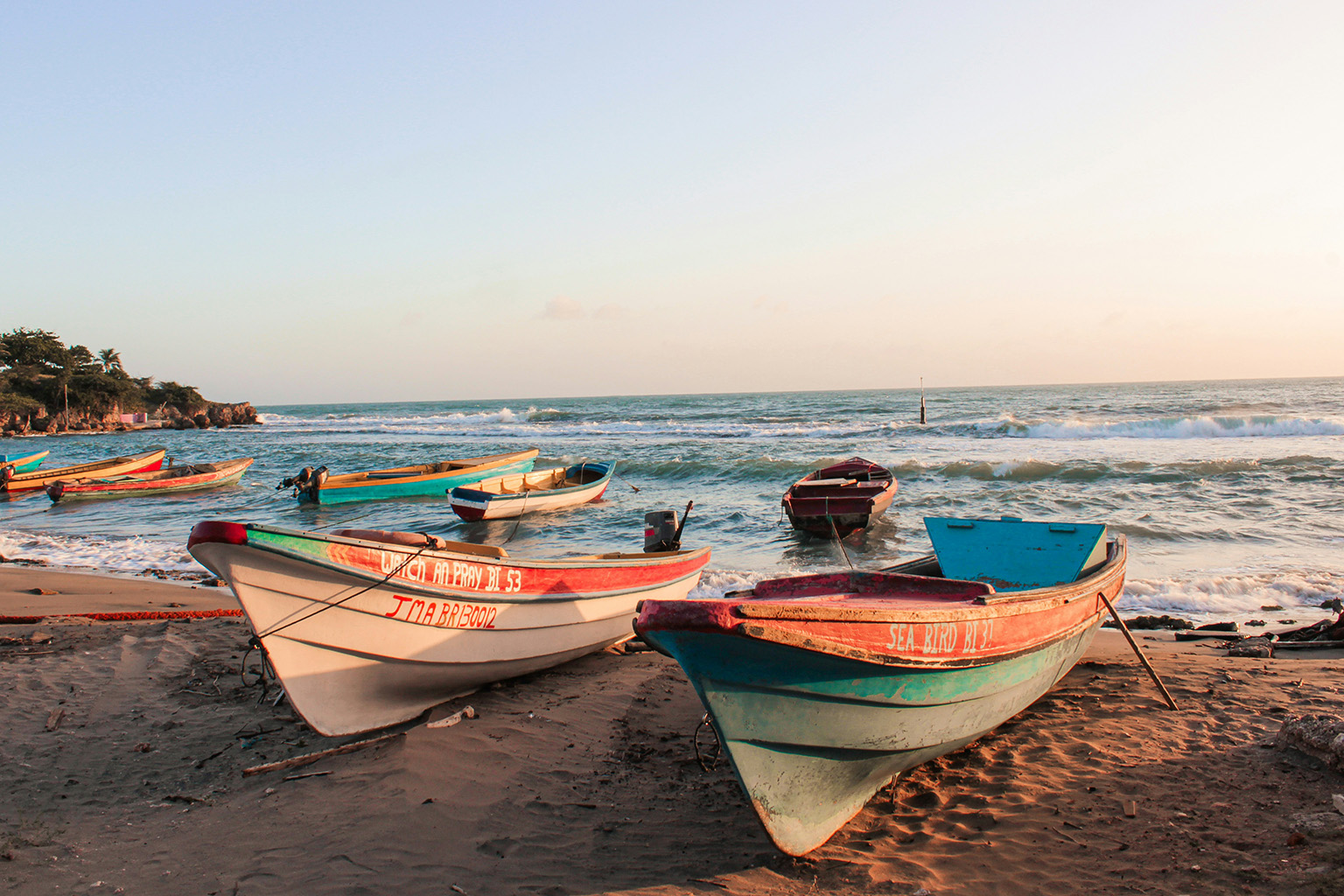
Wooden fishing boats rest on a beach – a peaceful glimpse into daily life in the Caribbean.
Making a Living in Paradise: The Reality of Work
The Caribbean region is primarily known for its tourism industry, which means that most of the available jobs on the islands are related to restaurants and resorts. Some territories may also prefer to hire locals. Here are some of the challenges can impact both locals and expats seeking employment opportunities. Some of the key challenges include:
- Economic Factors: The Caribbean region faces economic challenges, including high unemployment rates and limited job opportunities in certain industries.
- Competition: With a relatively small job market compared to larger countries, competition for available positions can be intense.
- Work Permits and Visas: For expats looking to work in the Caribbean, navigating the requirements for work permits and visas can be complex.
- Skills Mismatch: There may be a mismatch between the skills demanded by employers and the skills possessed by job seekers
- Remuneration and Benefits: The compensation packages offered for certain roles in the Caribbean may not always align with the expectations of job seekers, especially those accustomed to higher salary levels in other regions.
- Infrastructure and Connectivity: Access to reliable infrastructure, including transportation and internet connectivity, can vary across different Caribbean nations.
- Cultural Adaptation: For expats, adapting to the cultural nuances of working in the Caribbean can pose a challenge. Understanding local work practices and customs is essential for successful integration into the workforce.
Is Life in the Caribbean Still Your Dream?
It’s important to remember that vacationing on an island is a completely different experience compared to life in the Caribbean.
When you’re on vacation, you only get to see the positive aspects of island life. However, once you spend a few months there, you’ll start to notice the negative aspects as well.
That being said, everyone has different preferences, and it ultimately depends on the kind of lifestyle you’re seeking. If you’re looking for a simple life and a close connection with nature, your life in the Caribbean might be a perfect fit for you.
While Caribbean life has its charms, it’s worth looking at the broader picture. Exploring the 10 advantages of living in Latin America can give you insight into why many expats choose mainland destinations for a mix of affordability, lifestyle options, and cultural experiences—factors that sometimes surpass what the islands can offer.
Before you make the decision to move, it’s important to carefully consider all the factors.
Explore our Interactive Residency Map!
See which Latin American countries align with your goals — and whether you qualify for residency. Sign up below to get our map delivered straight to your inbox.

